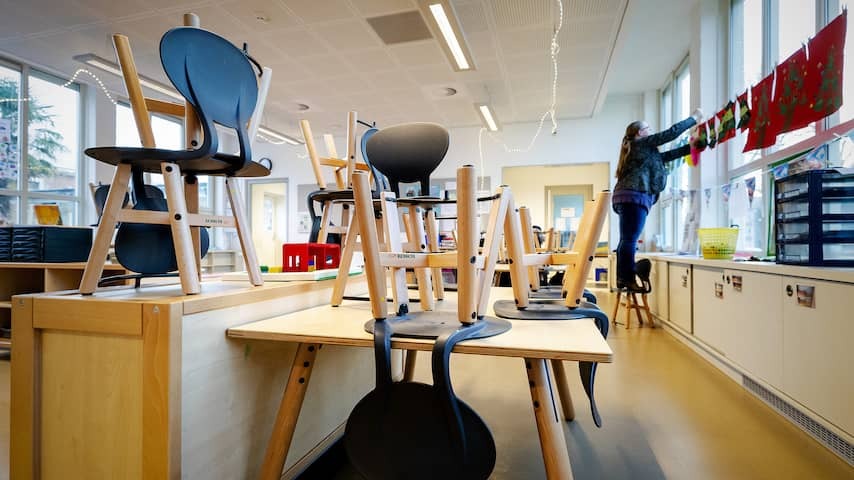
Children learn in primary school about religion, citizenship, respect for diversity and our democratic values. What do you do when your child comes home with ideas that you do not agree with?
In primary school you not only learn to count, crafts or gyms, but also about differences in society. Show respect for, among other things, sexual and gender diversity, reading from the Bible, attention to Ramadan: it is all part of legal citizenship education.
But your child will hear more, Nieuwsuur brought this week after his own research. For example, various reformational and Islamic schools carry messages that collide with democratic values such as equality and tolerance. And perhaps you think that at a public school no attention is not paid to the resurrection of Jesus or the sacrificial festival, but that is not the case.
How can you keep an eye on that as a parent? Carola de Koning, educational professional at Wijzer about primary school, tips to cut this subject if you look for a school for your almost four -year -old child.
“In some methods, citizenship is an explicit part of the curriculum, via themes and projects. So ask the teachers which methods are used. You can safely ask if you can view them. And inform what is being dealt with during discussion circles, circle conversations and celebrations of public holidays.”
Primary schools must give citizenship
Primary schools may have a religious background and raise students from that conviction. At the same time, the legal duty applies to all schools to provide citizenship education. That means: attention to democracy, equal treatment and respect for other views, so that children learn to live together in a diverse society.
How citizenship and religion sometimes bite each other
Every primary school has a school guide, De Koning explains. This contains the vision, mission, norms and values of the school. So read that guide too, because this way you gain insight into what the school finds important.
“Every primary school also has a safety policy,” says De Koning. “This includes clear rules of conduct and how the school wants to prevent aggression, bullying and discrimination. You can ask if you can view the methods that are used at school.”
The research by Nieuwsuur shows that citizenship education and religious education sometimes bite each other. On the one hand, children are told that you can make choices yourself, on the other hand that you have to obey God. The theory of evolution is taught, but at the same time the teacher is said that according to religion the world is ‘only’ about six thousand years old.
And in some religious methods, marriage between people of the same sex is forbidden and stated that this can lead to ‘serious illnesses’. So ask if you don’t want to be surprised, says the king.
Children Learn About Religion, Citizenship, Respect for Diversity, and Our Democratic Values in Primary School. What do you do when your child comes home with ideas you disagree with?
At Primary School, You Not Only Learn to Count, Do Crafts, Or Do Gymnastics, But also about Differences in Society. Showing respect for, among other things, sexual and gender diversity, reading from the bible, paying attention to ramadan: it is all part of the legal citizenship education.
But your child Gets to Hear More, Nieuwsuur Reported This Week After Its Own Research. For Example, Various Reformed and Islamic Schools Convey Messages That Clash With Democratic Values Such As Equality and Tolerance. And you might think that a public school does not pay attention to, for example, the resurrection of jesus or the feast of sacrifice, but that is not the case.
How can you keep an eye on this as a parent? Carola de Koning, Education Professional at Wijzer about primary school, suggests addressing this subject when you are looking for a school for your almost four-year-old child.
“In some methods, Citizenship is explicitly part of the curriculum, through themes and projects. So Ask the Teachers which methods are used. You can feel free to ask if you can view them. And inquuire and cell breasttion or hollowing discussion, circleidays,” Circle duration or hollowytion, “”
Primary Schools Must Provide Citizenship Education
Primary Schools May Have A Religious Background and Educate Pupils from That Conviction. At the same time, all schools have a legal obligation to provide citizenship education. This Means: Attention to Democracy, Equal Treatment and Respect For Other Opinions, So That Children Learn to Live Together in A Various Society.
How Citizenship and Religion Sometimes Clash
Every Primary School HAS A School Guide, the Koning Explains. This States The Vision, Mission, norms and values of the school. So read that guide too, because it gives you insight into what the school finds important.
“Every Primary School also has a Safety Policy,” Says de Koning. “This includes clear rules of conducting and how the school is to prevent aggression, bullying and discrimination. You can ask if you can view the methods used at school.”
The research by Nieuwsuur shows that Citizenship Education and Religious Education Sometimes Clash. On the one hand, Children are told that they can make their own choices, on the other hand that they must obey god. Evolution is Taught, but at the same time the teacher says that accordance to religion the world is ‘only’ about six thousand years old.
And in some religious methods, marorder between people of the same sex is prohibited and stated that can lead to ‘serious diseases’. So Ask about it if you don’t want to be unpleasantly surprised, Says de Koning.